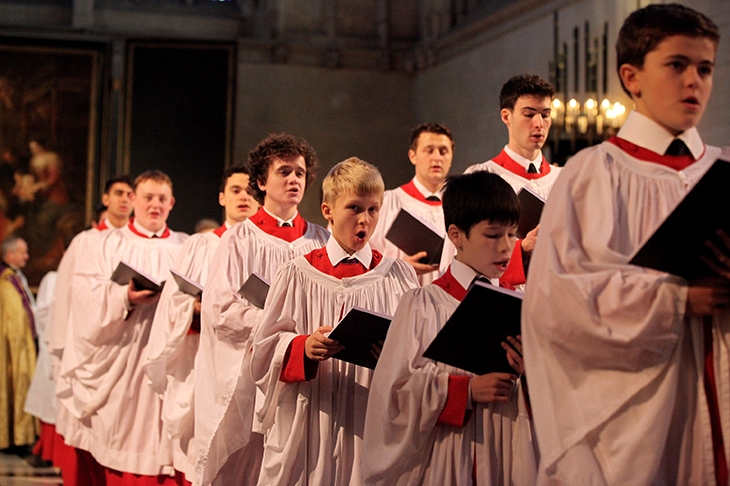Earlier this year The Spectator published an article in celebration of Evensong — the nightly sung service of the Anglican Church. Attendance, it seems, is not just up but dramatically so. While church visitor figures across the UK have fallen steadily and substantially since the 1960s, congregations at sung services have swollen up to ten times over, often rising to three figures. Why?
The answers come easily enough. In an increasingly volatile world, the certainty and beauty of Evensong offers a welcome still point — time and space to contemplate, meditate, an opportunity to listen to voices raised in a candlelit chapel and experience spirituality aesthetically rather than intellectually.
The greatest appeal of all, however, seems to lie in the idea of continuity. To attend Evensong is to take part in a great tradition that has continued unbroken in these ancient buildings for centuries, to become part of something bigger and more enduring than oneself. It’s a comforting idea but one, as Timothy Day’s I Saw Eternity the Other Night so elegantly demonstrates, that is more fiction than fact.
‘A source of grief and shame to well disposed and well instructed persons.’ That was the composer S.S. Wesley’s damning verdict on the quality of cathedral singing in 1849. Others saw the choirs as ‘schools for irreverence’, horrified at their ‘untrained and uneducated’ personnel and the lack of ‘refinement’ in their performances. Far from being the envy of the world, as convention would have it, English church music was in a lamentable state, and had been for some time.
But if ancient tradition is revealed as a 20th-century invention, it raises the more interesting question of why it was necessary to invent it in the first place? Could it be that what we’d like to champion as a triumphant constant of our national history is in fact much more unstable, a touchstone for ever-shifting and sometimes inadmissible priorities of class, gender, politics and aesthetics?
Day’s book sells itself simply, as a history and unpacking of the famous ‘King’s sound’ — the distinctive, and for many unequalled, tone of the Choir of King’s College, Cambridge. But while there’s certainly material here on the mechanics of voice production and the acoustic science of King’s Chapel, sound quickly becomes a metaphor for identity: if a man’s character can be heard in his voice, so a nation’s can emerge through its choirs.
Choirs, and the cathedrals and colleges that house them, are microcosms; who gets to sing in them and how much they are paid, their age, institutional and social status and the repertoire they perform all speak to priorities that have very little to do with music itself. You only have to look at the ‘stiff, venomous opposition’ to the recent introduction of female choristers at Salisbury to see such agendas in action, to see exposed what Day describes as the ‘dauntingly artificial, resolutely hierarchical, excessively intellectual, obsessively inward-looking, and highly self-conscious’ politics of the cathedral close.
But if the current touchstone is gender, it was class that defined choral institutions for much of the 19th century. In an age in which music was dismissed (by no less an authority than Ruskin) as an animal art —all untutored instinct and emotion — and music degrees were not deemed appropriate for gentlemen, where English musicians still lacked a national academy or conservatoire, anyone employed in the profession was treated with suspicion and valued accordingly. Boy choristers too, far from the angelic, middle-class creatures of today, were rough, sometimes illiterate children, more likely to be found smoking, drinking and fighting than singing. Small wonder that singers were seen as the ‘drudges’ of cathedrals, with little expected from them.
It’s Romanticism, according to Day, that we have to thank for the subsequent volte face. Children were transformed from uncivilised creatures that should be seen and not heard into symbols of sacred purity (a fetishisation of innocence still evident in almost every reaction to Carols From King’s), while music was elevated in status among the arts — its ineffable, emotion-driven qualities newly revered. It was here, in this rarefied world that the ‘ancient’ English choral tradition of fluting boy trebles and cassock-clad men was truly born.
Day is an expert guide to the often closed world of cathedral and college music-making. He wears his authority lightly, balancing tremendous knowledge and obvious affection for its institutions with just the occasional flicker of impatience towards their many quirks and shibboleths — not all of which are entirely benign.
What is the secret of the King’s sound, the musical ‘embodiment of an ideal of perfection’ that makes it the most famous choir in the world? Reticence, apparently. Defined above all by its blend, the unanimity and uniformity of 30 voices singing as one, the choir is the ultimate symbol of English self-effacement. In our age of the selfie, where flamboyance, vulgarity and excess are kings and narcissism is less a condition than a credo, what could be more exotic, more extraordinary than that?






Comments